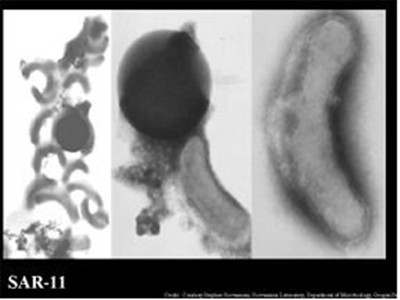For many scientists, a species'success is measured by sheer numbers.
对很多科学家来说,一个物种的成功完全取决于数量。
In that case, the most successful species known toman is a type of bacterium known as S-A-R-11, or SAR-11 for short.
如果是那样是话,为人类所知的最成功的物种就是一种简称“SAR-11”的细菌。
Scientists estimate that there are two-hundred and forty times a billion billion billion SAR11 cells floating around in the oceans.
科学家们估计海洋中的SAR11细胞的数量超过2 x 10的28次方个。
Now that makes six-billion humans sound like a merehandful.
那让60亿人类听起来屈指可数。

SAR11 bacteria are known for their ability to transform one substance into another, which is whythey are such an important part of the Earth's chemical cycles.
SAR11细菌以其转换物质的能力为人所知。而这也使得它们成为地球化学循环中重要的部分。
Although scientists are stilluncertain about SAR11's specific role, it appears to produce carbon dioxide using the oxygen andcarbon from organic matter that's derived from photo synthesis.
尽管科学家不能确定SAR11的具体作用。但它似乎可以使来自于光合作用的氧气和有机物种的碳发生作用,产生二氧化碳。
Scientists speculate that SAR11plays a major role in the way the ocean's surface acts as a giant carbon pump that removescarbon dioxide from the atmosphere.
科学家推测SAR11在海洋表面扮演着重要的作用,作为一个巨大的碳泵移除空气中的二氧化碳。
The catch is that SAR11 is what is known as an uncultured organism, which means that scientistshaven't been able to cultivate it under laboratory conditions.
但目前SAR11是为培养生物,也就是说科学家不能在实验室里培养出这种细菌。
This requires scientists to developpretty indirect genetic methods just to be able to study SAR11 cultures.
因此需要科学家们研制出间接遗传方法,来研究SAR11。
Now that this technologyis available, scientists are sequencing the SAR11 genome in order to figure out exactly what kindsof carbon it uses, and why it's so successful at ocean living.
既然这项技术可用,科学家为了弄清楚究竟SAR11用的是哪种碳以及为什么它会如此的成功在海洋中生活,正在排序它的基因组。



